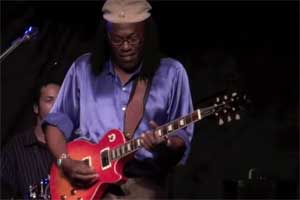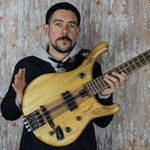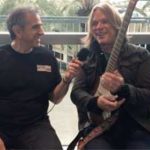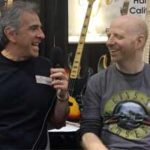The veteran bluesman talks history, heritage and Grammy Awards
By Gary Graff
January 6, 2016
At the age of 67 Joe Louis Walker is a bit young to be an elder statesman of the blues, but circumstances — primarily the deaths of many of his forebears — have put him in that position. And he certainly has the credentials to support that status. Playing since his teens, the San Francisco-born Walker has played with a who’s-who list of other musicians and even lived for a time with the late Mike Bloomfield. Walker spent time playing gospel as well, but dedicated himself full-time to the blues with his band, the Bosstalkers, during the mid-’80s and has continued ever since. He’s shared Grammy Awards collaborating with B.B. King and Otis Rush, while his own latest release, Everybody Wants a Piece, dropped during 2015 and is nominated for a Grammy this year for Best Contemporary Blues Album. It’s been a long trip, not necessarily all that strange, and Walker has no plans to stop any time soon.
FGPO: It’s big news to get a Grammy nomination, even at this point in your career, no?
Walker: Yeah it is. It’s unexpected; I never expect to win awards. When I win them I’m sort of surprised. Like the [Blues Music Awards], when I won for contemporary artist this year, I really wasn’t expecting it, and I sure wasn’t expecting the Grammy nod. It just shows that [if] you keep your nose to the grindstone stuff can happen.
FGPO: And it’ll be different than your other Grammy experiences.
Walker: I’ve been primarily involved with a few of them. One was with B.B. King we got for Blues Summit. One was with James Cotton for a project we pulled together for him [Cotton Mouth Man), myself and Charlie Haden and the late Dave Maxwell. We got the Grammy on that one. I got nominated with Robert Jr. Lockwood ’cause I was instrumental with making his record [Last of the Great Mississippi Delta Bluesmen: Live In Dallas] — and for Scotty Moore’s record, All The King’s Men. So I’ve been involved in quite a few situations there. I’ve been to the Grammy Awards and we had fun, a lot of fun. It should be exciting. That’s what makes it gratifying.
FGPO: Did Everybody Wants A Piece feel like something a little more special when you made it?
Walker: To be quite honest — no. [laughs] I think I was nominated for a career as opposed to this one record. If you look at all the people I’m up against, they’re all great artists. But I think I’ve been making records the longest out of all of them. I’m not blowing my own horn, just I’ve been involved with quite a lot of collaborations and stuff. They’ve always known me, but a lot of times people feel like it’s not what you do but who you know and who knows your name. That’s why someone like Cyndi Lauper could win a blues Grammy, or Jack Elliott. People know their name. They haven’t been doing blues projects all their lives, but they’ve had blues projects and their names are well known, so they get nominated. That’s OK; you’ve just to got to play the hand you’re dealt.
FGPO: You’ve been at this for a long time, more than 50 years. What’s your perspective on your career at this point?
Walker: It’s formidable, to be quite honest. When you look at it on a piece of paper, it’s like, “Jesus Christ, this guy was everywhere!” I’ve made records with Branford Marsalis, Peter Green, James Lockwood — “Damn, where wasn’t this guy?!” That’s been my motto. I want to be everywhere Louis Armstrong went. I want to do everything B.B. King and Buddy Guy did. I mean, going on 67 and being named the [best] contemporary blues artist in 2016, that’s very gratifying, y’know?
FGPO: How did you get started in this — guitar and music in general?
Walker: My dad used to play all the blues guys’ records when he was alive. When I was a little kid, if I was good he played records; if I was a bad boy he wouldn’t, and I got hooked on hearing that music, that sound, regardless of who was playing it. He made it so it was a lot of encouragement at home. And then when I moved, when my mother and father split up and my mother moved to the Fillmore district, my four cousins had a family band that was tailor-made for me. So I was able to play and really get a taste of what it feels like to be a musician and always surrounded by music. It seemed like something that was ordained for me.
FGPO: What was your path to the guitar?
Walker: I first started playing instruments when I was about eight. I tried out violin first, then accordion, and bass guitar, then drums. I wasn’t a very good drummer, but all the rest of them, and keyboards…I had a taste for plucking music out and stuff like that. Then my mom made me a deal when I was about 12; she said: “If you want to learn music, I’m gonna send you to a teacher every Saturday. That means you have to forget sports, all that stuff. You have to be committed to music before I buy you a guitar because we don’t have the money.” I jumped on that opportunity, man, and never looked back.
FGPO: Talk about that early band with your cousins. That had to be impactful.
Walker: Oh yeah, man. That gave me real hands-on [experience]. I just kept escalating to the point where I got to be pretty good when I was about 14. We would play for motorcycle clubs, sock hops, at the Fillmore Auditorium before bands came there. We’d play for friends at a local gym, the Hamilton YMCA. So we got to be pretty good. The epitome of that was when my dad hired me and my cousins to play at my sister’s wedding. That made us feel real good. I was about 15 when I joined the Musicians Union, Local 6 in San Francisco. I’ve been on the union all my life. Then I left home at about 16 and got on that journey, so to speak.
FGPO: Did you have any kind of goal in mind about what you wanted to do with your music?
Walker: Y’know, when you’re young you really don’t have a set of goals; you just want to get out there and let people hear you. You don’t have a plan or anything like that. I started trying to formulate a plan to play with better people, older people, all the blues guys that came to town — Mississippi Fred McDowell, John Lee Hooker, guys in San Francisco like J.J. Malone. I started to get to know those guys and learn from them and started getting gigs. When Muddy [Waters] let me open for him for a couple of weeks in Toronto in 1970, that really put me on the trajectory of being a professional musician. That was really something that made me feel like I was doing the right thing.
FGPO: It was a stamp of approval, right?
Walker: Right. When I was getting a bit of encouragement from those older guys…Some of them took me under their wing. If I didn’t have a guitar they’d let me play their guitars. Freddie King let me play his guitar when I didn’t have one, which was really kind of him. When guys do that for you and you’re a young guy, it validates what you’re trying to do. You’re just coming up through the ranks and trying to prove yourself, make a name for yourself, but you don’t have an idea of the general things that make for success, like copyright stuff, payroll taxes. Somebody has to make you aware of that so that when you do have a little bit of success you can enjoy it and not trying to figure out: “Oh, God, I wish I had done this…” It’s a learning curve and somebody has to somewhat help you with that. Nowadays young artists have so many professionals working with them. They have Facebook and those kinds of things. But back then we didn’t, and I was really lucky that those guys were there to help me out.
FGPO: Were you ever intimidated to be in that company?
Walker: Nah. I’m a firm believer that you have to make your own mistakes and learn more from your failures than from your success — and I had so many failures. [laughs] But I was fortunately always one of those guys who ended up in the right place at the right time, so it all pretty much worked out.
FGPO: You famously worked and lived with Mike Bloomfield during his time in the Bay Area. What was that like?
Walker: That happened when the [Paul] Butterfield Band came to San Francisco. All of the Bay Area bands were trying to do their version of The Band, the Grateful Dead, doing “Good Morning Little Schoolgirl.” When Butterfield came to town it was formidable, and when Michael played guitar it was like somebody dropped the bomb. The way he played was like the way the real guys played, ’cause he had been playing on the South Side of Chicago. So when I got together with Michael Bloomfield, he saw a bit of the younger guys from Chicago in me except that I didn’t have that edge they had coming out of there. So he took me under his wing and was like an older brother to me. He introduced me to a lot of people — like, everybody. When they started the Electric Flag I had to take Buddy Miles to practice, and I got to be good friends with Buddy Miles and the rest of the guys. I got to know Jimi Hendrix, Mick Taylor. It was a great time.
FGPO: You also had a front row seat for Michael’s demise. That had to be tough.
Walker: Y’know, we lived in that house off and on, on Carmelita Street, and I saw the music business sort of become an albatross around his neck. He didn’t want to be a “star.” He wanted to be a musician, like everybody I knew did. If you said you wanted to be a star you would be laughed out of the room. And Michael was the epitome of that. I don’t know anybody who had as much music as Michael had in him — blues, slide, steel, finger-picking. The only person I know who’s also got it to that extent is Taj Mahal, the whole musicology thing. Michael [was] like that. You were always in school at the house. People would come over on Tuesday and play acoustic guitar, on Wednesday to play piano. It was a real community for musicians; you’d wake up one day and Country Joe McDonald would be in the house playing acoustic guitar, the next day Mick Taylor would be playing records…just on and on and on. It was a great, just wonderful learning ground for me.
FGPO: What keeps you going after all this time?
Walker: I’m a restless spirit when it comes to music. I play all kinds of stuff. I’m known for the blues; I could say blues is my mother tongue, so to speak. But if you look at the people I’ve recorded with and been associated with, it runs across the canvas of musical genres. I’ve played with everybody from Herbie Hancock to Dr. John and Johnnie Johnson. I feel like if there’s one thing I’ve done it’s expand. Willie Dixon once told me, “I found your style, Joe. It’s all over the place — that’s your style. Just do what you do.” I always took that to heart.






